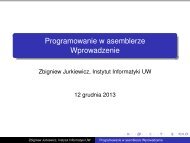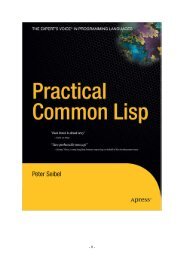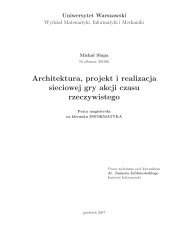Portugal
Portugal
Portugal
You also want an ePaper? Increase the reach of your titles
YUMPU automatically turns print PDFs into web optimized ePapers that Google loves.
clergy, greedy for power, fought the sovereign’s<br />
reform measures, which worked to<br />
ally the people more strongly with the<br />
crown. During the reign of Pedro’s son,<br />
Ferdinand I (1367–73), Castilian forces<br />
invaded <strong>Portugal</strong>, Lisbon was besieged,<br />
and the dynasty faced demise.<br />
In 1383, rather than submit to Spanish<br />
rule, the Portuguese people chose the illegitimate<br />
son of Pedro as regent. That<br />
established the house of Avis. João de Avis<br />
(reigned 1383–1433) secured Portuguese<br />
independence by defeating Castilian forces<br />
at Aljubarrota in 1385. His union with<br />
Philippa of Lancaster, the granddaughter<br />
of Edward III of England, produced a son<br />
who oversaw the emergence of <strong>Portugal</strong> as<br />
an empire—Prince Henry the Navigator.<br />
HENRY BUILDS A MARITIME EMPIRE<br />
Henry’s demand for geographical accuracy<br />
and his hunger for the East’s legendary<br />
gold, ivory, slaves, and spices drove him to<br />
exploration. To promote Christianity, he<br />
joined the fabled Christian kingdom of<br />
Prester John to drive the Muslims out of<br />
North Africa.<br />
To develop navigational and cartographic<br />
techniques, Henry established a<br />
community of scholars at Sagres, on the<br />
south coast of <strong>Portugal</strong>. He was responsible<br />
for the discovery of Madeira, the<br />
Azores, Cape Verde, Senegal, and Sierra<br />
discovered in 1419; the<br />
Azores are discovered in<br />
1427.<br />
■ 1488 Bartolomeu Dias<br />
rounds the Cape of Good<br />
Hope.<br />
■ 1498 Vasco da Gama rounds<br />
India’s west coast, opening<br />
up trade between the West<br />
and the East.<br />
■ 1500 Brazil is discovered.<br />
Peak of the reign of Manuel<br />
the Fortunate (1495–1521).<br />
<strong>Portugal</strong>’s Golden Age<br />
begins.<br />
■ 1521 <strong>Portugal</strong> becomes the<br />
first of the great maritime<br />
world empires, dominating<br />
access to the Indian Ocean.<br />
■ 1521–57 Reign of João III,<br />
ushering in Jesuits and the<br />
Inquisition.<br />
■ 1578 João’s son, Dom<br />
Sebastião, disappears in the<br />
battle of Morocco, leaving<br />
<strong>Portugal</strong> without an heir.<br />
Leone, and he provided the blueprint for<br />
continued exploration during the rest of<br />
the century. In 1482, Portuguese ships<br />
explored the mouth of the Congo, and in<br />
1488, Bartolomeu Dias rounded the Cape<br />
of Good Hope. In 1497, Vasco da Gama<br />
reached Calicut (Kozhikode), on India’s<br />
west coast, clearing the way for trade in<br />
spices, porcelain, silk, ivory, and slaves.<br />
The Treaty of Tordesillas, negotiated<br />
by João II in 1494, ensured <strong>Portugal</strong>’s<br />
possession of Brazil. Using the wealth of<br />
the whole empire, Manuel I (the Fortunate;<br />
reigned 1495–1521) inspired great<br />
monuments of art and architecture<br />
whose style now bears his name. His<br />
reign inspired <strong>Portugal</strong>’s Golden Age. By<br />
1521, the country had begun to tap into<br />
Brazil’s natural resources and had broken<br />
Venice’s spice-trade monopoly. As the first<br />
of the great maritime world empires,<br />
<strong>Portugal</strong> dominated access to the Indian<br />
Ocean.<br />
João III (reigned 1521–57) ushered in<br />
the Jesuits and the Inquisition. His son,<br />
Sebastião, disappeared in battle in<br />
Morocco in 1578, leaving <strong>Portugal</strong> without<br />
an heir. Philip II of Spain claimed the<br />
Portuguese throne and began 60 years of<br />
Spanish domination. In the East, Dutch<br />
and English traders undermined <strong>Portugal</strong>’s<br />
strength.<br />
■ 1581–1640 Philip II of<br />
Spain brings Habsburg rule<br />
to <strong>Portugal</strong>.<br />
■ 1640 Following a nationalist<br />
revolution, João IV restores<br />
independence and launches<br />
the House of Bragança.<br />
■ 1755 A great earthquake<br />
destroys Lisbon and parts of<br />
Alentejo and the Algarve.<br />
■ 1822 <strong>Portugal</strong> declares Brazil<br />
independent.<br />
continues<br />
17<br />
PORTUGAL IN DEPTH 2<br />
LOOKING BACK AT PORTUGAL





